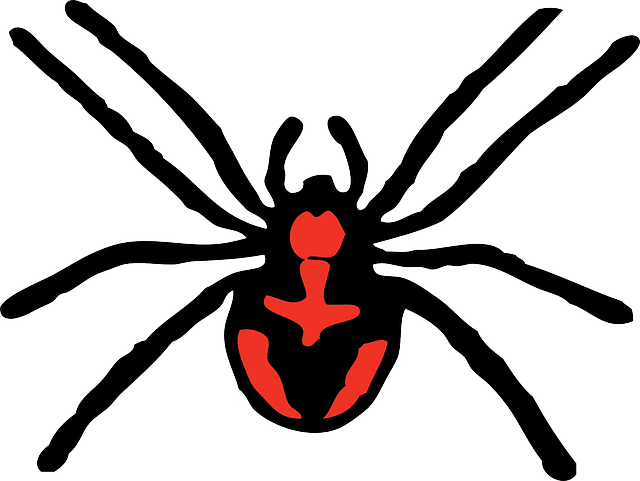Spiders can become invasive in homes and businesses, but with the right strategies, infestations can be prevented. Key measures include understanding spider behaviors, sealing entry points, maintaining cleanliness, using pheromone traps, natural deterrents, and regular inspections. For residential spaces, focus on clutter reduction, proper cleaning, and natural repellents like citrus oils or diatomaceous earth. Commercial facilities should employ advanced strategies such as negative air pressure, professional treatments, maintenance checks, and employee education to ensure a spider-free environment. Professional spider control services offer eco-friendly solutions tailored to residential and commercial needs, combining targeted treatments with ongoing protection.
“Keep your spaces spider-free with our comprehensive guide on spider infestation prevention. Discover expert strategies to fortify your home or business against these arachnid intruders. From understanding spider behavior and their preferred habitats to implementing professional prevention techniques and eco-friendly solutions, we equip you with the knowledge for effective spider control. Learn how to spider-proof your environment and reclaim your spaces.”
Understanding Spider Behavior and Their Habitats
Understanding Spider Behavior and Their Habitats
Spiders are arachnids known for their intricate web-spinning abilities, but they’re also insidious invaders that can find their way into homes and businesses through cracks, gaps, and even electrical lines. To effectively prevent a spider infestation, it’s crucial to understand these eight-legged creatures’ behaviors and preferred habitats. Spiders are generally attracted to dark, quiet spaces with easy access to food sources, such as insects or other small pests. They seek out hiding places like corners, attics, crawl spaces, and under furniture where they can build their webs and ambush prey.
Professional spider control services often employ eco-friendly solutions to address these habits. These methods include sealing entry points, maintaining a clean environment, using specific pheromone traps, and employing natural deterrents like citrus oils or mint. For residential spider prevention, regular inspections and proactive measures like vacuuming and dusting can significantly reduce the risk of an infestation. Commercial facilities should invest in comprehensive spider-proofing strategies that involve professional treatments, regular maintenance checks, and educating employees about potential signs of spider activity.
Professional Spider Infestation Prevention Strategies
Professional Spider Infestation Prevention Strategies involve a multi-faceted approach tailored to both residential and commercial settings. Expert pest control services begin with a thorough inspection, identifying entry points and active spider habitats. Once located, professionals employ eco-friendly methods like sealing cracks and gaps, installing mechanical traps, and applying targeted treatments to disrupt spider life cycles. Regular maintenance is key; bi-monthly inspections and treatment plans ensure ongoing protection against these arachnids.
For residential spider prevention, focusing on cleanliness and reducing clutter creates an unappealing environment for spiders. Using natural repellents like citrus oils or lavender can also deter them. In commercial spaces, professional spider control services go beyond basic maintenance by implementing more robust strategies, such as negative air pressure to contain infestations and regular treatment programs that target hard-to-reach areas. Spider-proofing your home or business significantly reduces the risk of unwanted arachnid visitors.
Eco-Friendly Solutions for Spider Control
When it comes to spider control, there’s a growing demand for eco-friendly solutions that are safe for both people and the environment. Traditional pest control methods often rely on synthetic chemicals which can leave behind harmful residues and contribute to environmental pollution. However, professionals in spider infestation prevention now offer effective yet green alternatives. These methods include using natural repellents like citrus oils, peppermint, or neem oil, which have been proven to deter spiders without causing any significant harm. Encouraging the presence of natural predators such as birds, bats, and certain insects is another sustainable approach to spider-proofing your home or commercial space.
Implementing simple residential spider prevention tips can significantly reduce the risk of an infestation. Regular cleaning and maintaining a clutter-free environment are essential. Vacuuming floors and walls can help remove webs and capture spiders. Additionally, sealing entry points like cracks and gaps in windows and doors is crucial to prevent their access. For commercial spaces, regular inspections by expert spider control services can identify potential issues early on. These professionals employ advanced techniques such as heat treatments and targeted application of natural pesticides to eliminate spiders without causing disruptions to business operations.
Spider-Proofing Your Home and Business: A Comprehensive Guide
Spider infestations can be a significant concern for both homeowners and business owners alike. To prevent these eight-legged intruders, it’s crucial to implement a comprehensive spider-proofing strategy. Start by identifying common entry points such as cracks, gaps in walls, or poorly sealed doors. Seal these openings with caulk or weatherstripping to create a physical barrier that stops spiders from entering. Regularly vacuum and clean your space, removing webbing and dust that may attract spiders.
Consider investing in professional spider control services for commercial spaces to ensure thorough treatment and ongoing prevention. For eco-conscious individuals, opt for natural, eco-friendly spider prevention solutions like essential oils (e.g., lemon, peppermint) or diatomaceous earth. These methods are safe for both people and pets while effectively deterring spiders. Additionally, maintaining a clean, clutter-free environment with proper ventilation can significantly reduce spider activity.
Preventing spider infestations requires a multi-faceted approach. By understanding spider behavior and creating an environment that discourages them, you can significantly reduce their presence. Professional spider control services offer specialized treatments tailored to specific needs, while eco-friendly solutions provide a safer alternative for those concerned about chemical exposure. Implementing effective spider prevention tips, such as regular cleaning, sealing entry points, and maintaining proper humidity levels, is crucial for both residential and commercial spaces. Following these strategies ensures a comfortable and spider-free environment for all.
